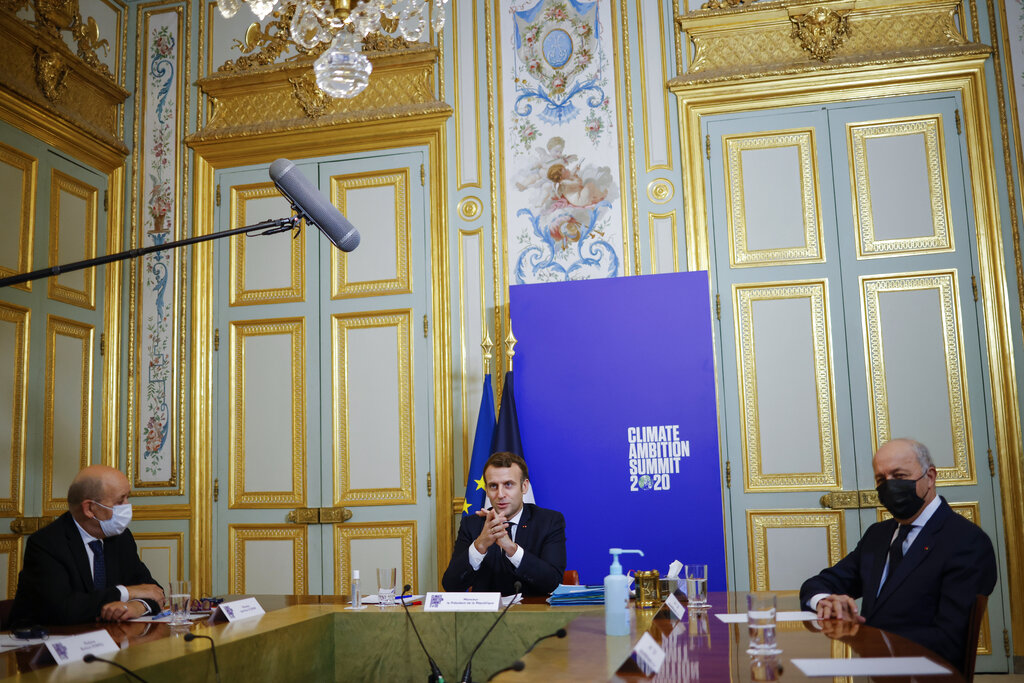

The United States is back in the Paris climate accord, just 107 days after it left.
While Friday’s return is heavily symbolic, world leaders say they expect America to prove its seriousness after four years of being pretty much absent. They are especially anticipating an announcement from the U.S. in coming months on its goal for cutting emissions of heat-trapping gases by 2030.
The U.S. return to the Paris agreement became official Friday, almost a month after President Joe Biden told the United Nations that America wants back in. “A cry for survival comes from the planet itself,” Biden said in his inaugural address. “A cry that can’t be any more desperate or any more clear now.”
Biden signed an executive order on his first day in office reversing the pullout ordered by his predecessor, President Donald Trump. The Trump administration had announced its withdrawal from the Paris accord in 2019 but it didn’t become effective until Nov. 4, 2020, the day after the election, because of provisions in the agreement.
United Nations Secretary-General Antonio Guterres said Thursday that the official American re-entry “is itself very important,” as is Biden’s announcement that the U.S. will return to providing climate aid to poorer nations, as promised in 2009.
“It’s the political message that’s being sent,” said Christiana Figueres, the former United Nations climate chief. She was one of the leading forces in hammering out the 2015 mostly voluntary agreement where nations set their own goals to reduce greenhouse gases.
One fear was that other nations would follow America in abandoning the climate fight, but none did, Figueres said. She said the real issue was four years of climate inaction by the Trump administration. American cities, states and businesses still worked to reduce heat-trapping carbon dioxide, but without the federal government.
“From a political symbolism perspective, whether it’s 100 days or four years, it’s basically the same thing,” Figueres said. “It’s not about how many days. It’s the political symbolism that the largest economy refuses to see the opportunity of addressing climate change.”
“We’ve lost too much time,” Figueres said.
United Nations Environment Programme Director Inger Andersen said America has to prove its leadership to the rest of the world, but she said she has no doubt it will when it submits its required emissions cutting targets. The Biden administration promises to announce them before an Earth Day summit in April.
“We hope they will translate into a very meaningful reduction of emissions and they will be an example for other countries to follow,” Guterres said. Already more than 120 nations, including No. 1 emitter China, have promised to have net zero carbon emissions around midcentury.
University of Maryland environment professor Nate Hultman, who worked on the Obama administration’s official Paris goal, said he expects a 2030 target of cutting carbon dioxide emissions between 40% and 50% from the 2005 baseline levels.
Wyoming Sen. John Barrasso, the top Republican on the Senate energy panel, has criticized Biden for rejoining Paris, tweeting: “Returning to the Paris climate agreement will raise Americans’ energy costs and won’t solve climate change. The Biden administration will set unworkable targets for the United States while China and Russia can continue with business as usual.”
A longtime international goal, included in the Paris accord with an even more stringent target, is to keep warming below 2 degrees Celsius (3.6 degrees Fahrenheit) since pre-industrial times. The world has already warmed 1.2 degrees Celsius (2.2 degrees Fahrenheit) since that time.
The U.S. rejoining the Paris accord and coming up with an ambitious target for emissions cuts would make limiting warming “to well below 2 degrees — not just to 2 degrees but below 2 degrees — a lot more likely,” said climate scientist Zeke Hausfather, energy and climate director for the Breakthrough Institute.